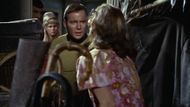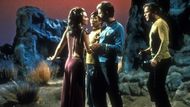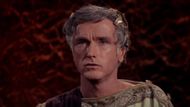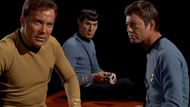For almost twenty years, British Trekkies were denied a handful of classic Star Trek episodes. Miri, along with Plato’s Stepchildren, The Empath, and Whom Gods Destroy, got the axe in the UK. The BBC looked at the darker stuff, such as madness, torture, and all that unsettling sci-fi business, and decided it wasn’t suitable for their younger audience. So, from the early ’70s right up until the early ’90s, those episodes just didn’t air.
Star Trek (the OG show, not Next Gen or anything) started in the US back in 1966. It was created by Gene Roddenberry and got super popular because it wasn’t just about aliens and space lasers; it poked at real-world issues, philosophy, and futuristic visions of humanity. When the BBC picked it up and started showing it in 1969, they figured it was good family fun, something everyone could watch together. At first, anyway.
Then they hit a couple of these darker episodes and decided not to traumatize the kids. So, the four episodes just... disappeared from the lineup. No epic explanation or anything, just “these deal with unpleasant subjects in an unpleasant way.”
Back in the ’70s and ’80s, the UK was way more uptight about what made it onto TV, especially if they thought kids might be watching. Unlike the US, where Star Trek was for everyone, the BBC mostly saw it as a show for younger viewers, so they played it super safe.
If you grew up watching Star Trek in Britain, you got the PG version, and you probably wondered why some storylines never made any sense.
The banned Star Trek episodes and their themes
"Miri" (Season 1, episode 8)

In this Star Trek episode, the Enterprise gets an emergency call and zooms down to a planet that looks exactly like Earth. But it’s creepily quiet, except for some kids wandering around. Turns out, all the adults got wiped out by a botched science experiment: a plague that was supposed to make people live longer, but it just killed the grown-ups and left the kids stuck as kids. The catch is that as soon as these kids hit puberty, they age overnight and die.
Captain Kirk and his crew want to help, but the kids, led by this boy named Jahn, are not having it. They’re wild, paranoid, and a little terrifying. They jack the crew’s communicators, which is a huge problem because Dr. McCoy is scrambling to whip up a cure and needs his gear.
The whole theme is super dark: kids turning on adults, disease everywhere, and this sense that things could go sideways at any second. Eventually, Dr. McCoy cracks the code and saves the day with a vaccine, but not before it gets seriously chaotic. Almost loses a few people in the process.
Why did the BBC ban it? They took one look at all the sick kids, the violence, and the whole horror-movie death theme and said that this is way too much for British kids to handle. Star Trek was popular with younger viewers in the UK, and seeing children as creepy villains (and dying left and right) was just not something they wanted. So, they nixed it.
"Whom Gods Destroy" (Season 3, episode 14)

The Enterprise is on a pharmacy run, dropping off some fancy new meds at a high-security loony bin on Elba II, where Starfleet dumps its most dangerous criminally insane. But the patients have taken over the asylum, led by Garth of Izar. This guy used to be a hotshot fleet captain. Now he has become a megalomaniac with the added bonus of shapeshifting powers. He’s running around pretending to be the head doc, scheming to jack the Enterprise and to conquer the galaxy.
Kirk and Spock get imprisoned right out of the gate. Garth puts them through psychological torture, such as mind games, manipulation, and some nasty torment bits. At one point, things get so hectic that Garth blows up another inmate just to make a point. Eventually, it all comes down to Spock identifying the real and fake Kirk and restoring order.
So, why did the BBC ban this episode? Again, it was just too much. The visuals - madness, torture, people getting blown up for fun- were way darker than what kids were seeing after school. They figured, let’s not traumatize the next generation of Star Trek fans.
"Plato's Stepchildren" (Season 3, episode 10)

The Enterprise picks up this distress signal, and they rock up to a bizarre planet where an alien civilization is living out their best ancient Greece-like culture. The ruling class, called the Platonians, has telekinetic powers, and they use them to humiliate/dominate others.
Parmen, the big boss, decides to treat Kirk, Spock, McCoy, and later Uhura and Chapel like his own personal puppets. He forces them to dance and act like fools and humiliates them for giggles. It gets super uncomfortable, sadistic, even.
And this is the Star Trek episode where Kirk and Uhura share that famous (and controversial at the time) interracial kiss. People always gossip that this was the reason the UK banned it, but it wasn’t.
Eventually, McCoy develops some sci-fi potion so Kirk and Spock can finally push back, leveling the playing field and putting the Platonians in their place.
As for the ban, the BBC noped out because the episode has got way too much forced humiliation and torture going on. Brit TV folks just thought it was a little too twisted for their viewers’ tea time.
"The Empath" (Season 3, episode 12)

Kirk, Spock, and McCoy are captured by an alien race called the Vians and dragged into some dingy underground lab. Down there, they run into Gem, who’s this mute empathic alien. She has an ability to soak up other people’s pain: literally take their wounds and suffering onto herself.
Meanwhile, the Vians are just peachy. They treat Kirk and the gang like guinea pigs, running them through all kinds of brutal, pointless torture. The stuff is rough and way darker than your average space shenanigans. Gem keeps stepping in, absorbing their pain, nearly wrecking herself to keep them alive.
Eventually, the crew’s willingness to stick together and suffer for each other impresses the Vians, and things take a turn.
Why’d the BBC give this one the boot? Simple: it’s grim. Nonstop torture, not a lot of hope, and just an overall dark tone.
The BBC basically put a ban on these episodes because they figured the content was way too heavy, had way too much violence, or had dark themes for what people thought was just a kids’ show. Brits saw Star Trek as something for the Saturday morning crowd, while in the States, it was a huge family event, with parents and kids all in, ready for whatever moral quagmire Kirk stumbled into that week.
Anyway, fans in the UK were not having it. All through the ‘70s and ‘80s, they kept firing off letters complaining, but all they ever got back was the same canned response, over and over:
“There are no plans to screen the four episodes because we feel that they deal most unpleasantly with the already unpleasant subjects of madness, torture, sadism and disease. You will appreciate that account must be taken that out of Star Trek's large and enthusiastic following, many are juveniles who would watch the programme no matter what time of day the series is put into the programme schedules.”
Back in the early ’90s, the BBC finally decided to air these four episodes. Times were changing, people were flipping through more cable channels, TV was getting a bit more daring, and everyone was just less uptight about what you could show.
Fast forward to now, and you can stream those once-forbidden episodes on Paramount+ or just grab them on Blu-ray. Still, the whole saga is a reminder of how much what we see on TV depends on whatever cultural context governs media distribution.
